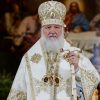When you are visiting someone and they show you their family photo album, you cannot do without some additional commentary to help you correctly familiarize yourself with the people depicted. After all, the family archive is the property of a given family, so that an outsider might not understand everything on his own.
The Bible was written for the chosen people, of whom the people of God – that is, the Church of Christ – became the heirs following the coming into the world of the Lord and Savior. Therefore it needs to be understood as it is understood by the family to which it belongs, that is, the Church.
But first let us think about the following. Today everyone can acquire a Bible, open it, and begin reading. What does one need for this reading to lead to positive results, to be saving? And can one read the Bible as one would read an ordinary book?
The Bible is a Divine book; it is the Word of God addressed to us. But one needs to prepare oneself to understand this Word correctly. If we open the sacred pages just anywhere on the subway or on the bus, and if we try to penetrate their meaning hastily or without any effort, then it is likely that we will understand nothing. It requires inner preparation and a certain spiritual disposition.
The Holy Fathers teach us that the reading of the Bible should be preceded by prayer, by the concentration of spiritual and mental powers in order to “cool down” from the feverishness of everyday life and to free us from the captivity of emotions, passions, and experiences. “May your reading be in quietness undisturbed by nothing,” St. Isaac the Syrian encourages us. Ancient monks read Scripture slowly and out loud, trying to concentrate maximum focus on the meaning of the Biblical text. In the Egyptian monasteries of the fourth century, monks memorized the Biblical text by heart, constantly repeating it to themselves over the course of the entire day. The great Russian saint of the nineteenth century, St. Seraphim of Sarov, said that the mind of a Christian should “swim” in the words of Scripture.
Reading the Bible, one needs to take it in readily not only in one’s mind, but also in one’s heart. One should read the Bible unhurriedly. One does not need to devour chapter after chapter, reading several pages without stopping. “When you read the Divine Scripture, do not do so only in order to read page after page,” says St. Nicodemus of the Holy Mountain, “but take heed to each word meditatively.” It is best of all to read no more than a chapter a day, contemplating what you read. It is very important to make note of unknown words in Holy Scripture and to write down expressions that are new to us, so that later we can refer to a commentary or ask a knowledgeable person in order to find an answer to questions that arise when reading the Word of God.
Reading the Bible, we enter into communion with God, coming to know Him and establishing a personal relationship with the Creator. Therefore the reading of the Bible is not only a rational, but also a deeply spiritual activity.
Depending on one’s level of knowledge, education, and life experience, one develops a perception and understanding of the Biblical text. There are some hidden dangers in this. One the one hand, individual work with the Word of God kindles religious feelings in us, strengthening our faith. On the other hand, we can always make mistakes when, reading the Bible, we come to erroneous conclusions out of ignorance, lack of experience, and the appropriate education.
In this regard, the question arises: is there a surefire criterion for correctly understanding Holy Scripture? The Church asserts that, inasmuch as the Bible is the book of the people of God, the Church, it is the Church-wide understanding that is the criterion by which one can avoid mistakes.
Why is the Church-wide understanding of the Bible unerring, while an individual might be mistaken?
The Bible is a Divine book, written by Divine inspiration and, in order to penetrate the essence of God’s message to the world and man, one needs to have the Holy Spirit in one’s heart.
People stand at different distances from God. Some stand closer, others further. Some have great gifts of the Holy Spirit, while others do not have these gifts. But it is known that in the Church, as a community of faith, there lives and acts that very same Divine Spirit that inspired the ancient Biblical authors of the Divinely-inspired texts. Therefore the Church, having within itself this Spirit, is able unerringly to comprehend the Word of God. This all-perfect interpretation of Holy Scripture does not consist, of course, in the individual statements of various Church figures, even the most enlightened and authoritative. The unerring understanding of the Word of God is guarded in Church teaching, which is formed on the basis of Holy Scripture, belongs to the Church, and is transmitted within its bosom from generation to generation. Thus, Church doctrine, based on the Word of God, is essentially an extensive commentary on the Word that was inspired by the power of the Holy Spirit.
With what solemnity and majesty does the reading of Holy Scripture take place in Church! In one of the most important moments of the divine services, the Word of God is solemnly carried into the middle of the church. Before a text is proclaimed during the Divine Liturgy, the priest reads a special prayer asking the Lord to help all those present to understand the meaning of what is being read. The deacon proclaims: “Wisdom, let us attend!” – thus emphasizing that the Word of God brings a special wisdom to people and that it needs to be listened to with special attention. After the reading of the Biblical texts at the Liturgy, there should be a sermon conveying the correct ecclesial understanding of the Divine truths.
Listening to the words of Holy Scripture, we stand with bowed head, ready to receive the Word of God. Listening to the words of eternal Divine Revelation, we part for a time from this world and immerse ourselves therein. For the Word of God, according to the Apostle, acts like the “sword of the Spirit” (Ephesians 6:17), capable of cutting to the quick of human nature, separating truth from falsehood, light from darkness, and good from evil. The Word of God possesses enormous strength to act upon people spiritually. And it is very important that, listening to this Word, we absorb the truth that the Holy Spirit gave to the ancient authors of the Bible and that to this very day has taught the Church of Christ, the community of faith.
Translated from the Russian.





















